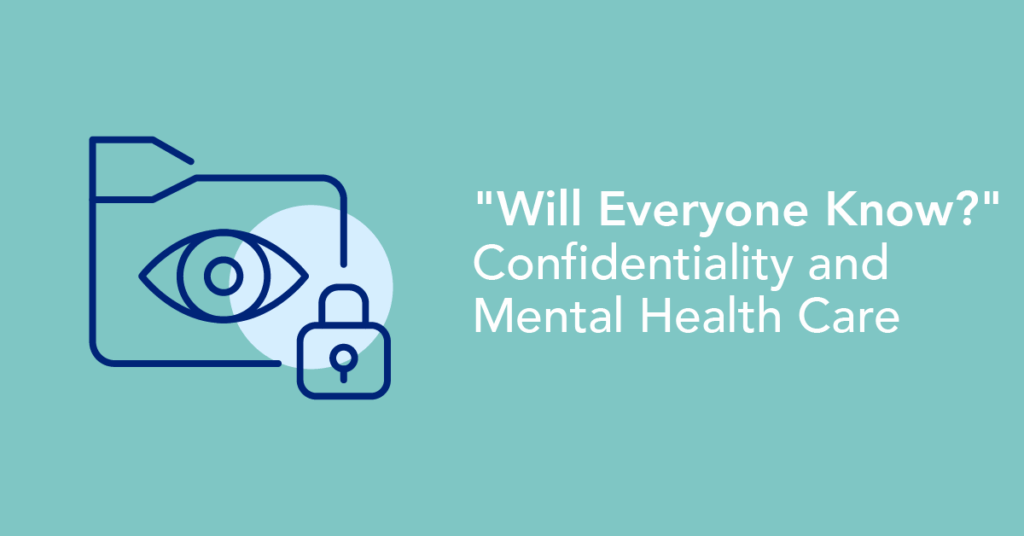Mental health confidentiality means your conversations with a therapist or mental health provider are legally protected and private, except in rare, specific circumstances.
If you’re considering therapy or treatment, it’s normal to wonder who’ll know about it. Worries like “Will this go on my record?” or “Can my employer find out?” can prevent people from seeking help — especially if they already feel vulnerable.
This article breaks down your rights, explains how confidentiality works in mental health care and clears up common fears about privacy.
What Is Mental Health Confidentiality?
Mental health confidentiality refers to the ethical and legal obligation of professionals to keep your personal information private. That includes:
- What you say in therapy
- Your diagnosis
- Medications or treatment plans
- Session notes
- Appointment records
In the United States, your privacy is largely protected by HIPAA (the Health Insurance Portability and Accountability Act), a federal law that outlines how health information is stored, shared and protected.
Why Confidentiality Matters
Therapy only works if you feel safe being honest. Mental health confidentiality exists to protect your dignity, encourage openness and reduce the stigma around getting help. Knowing your provider won’t share your private information without your consent makes it easier to explore difficult emotions and experiences.
It also ensures:
- Your mental health records aren’t shared without permission.
- Employers and schools can’t access your records on their own.
- You have control over who gets information and why.
Are There Any Exceptions?
There are some limited situations where a provider can share information without your permission. These are legal exceptions designed to protect you and others.
Your therapist may break confidentiality if:
- You’re at serious risk of harming yourself or someone else.
- There’s evidence of abuse or neglect involving a child, elder or dependent adult.
- They’re subpoenaed by a court of law.
- You consent to share your information with another provider or family member.
These exceptions are rare and typically involve serious, immediate safety concerns. Even then, providers will usually inform you when and why they need to disclose something.
How Does HIPAA Protect My Mental Health Information?
HIPAA and mental health privacy go hand in hand. Under HIPAA, mental health professionals must take specific steps to safeguard your data. This includes:
- Keeping paper records in secure, locked files
- Using encrypted digital systems for notes and communication
- Training staff on privacy procedures
- Limiting access to your records only to authorized personnel
Unless you give written consent through a release of mental health information, your details can’t be shared with anyone — not even your spouse, parent or employer.
HIPAA applies to:
- Psychologists and psychiatrists
- Licensed therapists and counselors
- Hospitals and clinics
- Insurance companies
- Telehealth platforms
It doesn’t apply to:
- Coaches or non-licensed support providers
- Anonymous peer support groups
- Social media or forums (unless linked to a medical provider)
What About Minors?
Mental health confidentiality works differently for people under 18. In many cases, parents or legal guardians have access to treatment records, but some states allow for confidential care for teens under specific circumstances (e.g., crisis counseling, substance use treatment or reproductive health).
Therapists will often work with minors and families to create privacy boundaries that support trust while keeping everyone informed and safe.
Will My Employer or School Find Out?
Your employer can’t access your mental health records without your written permission. If you use company insurance, they may see that you accessed a service but not what was discussed. If you’re requesting time off for treatment, HR may require documentation — but not personal details.
Schools may know about counseling appointments if services are provided on campus, but providers still protect the content of those sessions unless there’s a safety issue.
What Is a Release of Mental Health Information?
A release of information (ROI) is a form you sign that gives permission for a provider to share part or all of your mental health records with another person or entity.
You can:
- Choose what information to release
- Specify who can receive it
- Revoke consent at any time
This might be used when coordinating care between therapists, doctors or family members. No one can pressure you into signing it — it’s always voluntary unless legally mandated.
What If I’m in a Crisis?
If you’re in crisis and need emergency care, some information may be shared with medical personnel to provide life-saving treatment. Even then, the amount disclosed is limited to what’s necessary and must follow HIPAA rules.
You can still expect respectful communication, and any long-term treatment afterward will return to full confidentiality protections.
Frequently Asked Questions
No — not without your consent. The only exceptions are immediate safety concerns or legal requirements. Otherwise, everything you share is protected.
HIPAA protects all medical records, including diagnoses, medications, therapy notes and billing information. It ensures your provider must take steps to keep your information private.
Unless you’re a minor and your parents have legal access, your provider can’t speak to family members without a signed release form from you.
If a provider breaks confidentiality without legal justification, it may be grounds for a professional complaint or lawsuit. You can report violations to state licensing boards or the U.S. Department of Health and Human Services.
Reputable teletherapy platforms must comply with HIPAA. Make sure your provider uses secure software and avoids using unencrypted communication like email or text for sensitive information.
You Deserve Privacy and Protection
Mental health care should feel safe. You deserve to share your thoughts, feelings and fears with someone who’s bound to protect your privacy. Confidentiality isn’t a privilege — it’s your right.
If you’re avoiding therapy because you’re worried about who might find out, know that there are strong systems in place to keep your information secure.
Still unsure about how it works? Call the Mental Health Hotline. We’ll walk you through your privacy rights, answer your questions about care and help you take the first step toward healing.
Editorial Team
-
 Written By: Mental Health Hotline
Written By: Mental Health HotlineMental Health Hotline provides free, confidential support for individuals navigating mental health challenges and treatment options. Our content is created by a team of advocates and writers dedicated to offering clear, compassionate, and stigma-free information to help you take the next step toward healing.
-
 Reviewed By: Dr. Daphne Fatter
Reviewed By: Dr. Daphne Fatter


